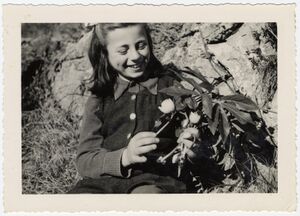Rosian Zerner / Rosian Bagriansky (F / Lithuania, 1935), Holocaust survivor
Rosian Zerner / Rosian Bagriansky (F / Lithuania, 1935), Holocaust survivor
- <Kovno Ghetto> <Hidden Children> -- <Jewish Brigade> <Italy> <Selvino Children> <United States>
Biography
USHMM Profile
Rosian Zerner (born Rosian Bagriansky) is the daughter of Paulius (Pol, later Paul) Bagriansky and Gerta Chason Bagriansky. Rosian was born in 1935 in Kaunas, Lithuania where her father was a prosperous international textile merchant. Her mother was a Paris trained concert pianist and music teacher who later became the Konzertmeister of the Lithuanian Opera after the war. The day after Rosian was born, her maternal grandparents, Julius and Anna (Blumenthal) Chason, and her aunts immigrated to Palestine to join their other aunt and uncle already there. The family lived in an apartment complex in the center of Kaunas that belonged to Rosian's paternal grandfather, who owned one of the first electric flour-processing factory mills in Lithuania. Planning for his family to emigrate, Paulius had purchased land in Canada, but the outbreak of World War II precluded these plans from materializing.
In June 1940 the Soviet Union seized control of Lithuania and the following year, on June 22, 1941 Germany launched a surprise invasion of the Soviet Union. Two months later, the Jews of Kaunas were ordered into a ghetto. Rosian's family had previously led a privileged life that included ownerhisp of a 1935 Ford with chauffeur and servants. They now had to share one room and fend off starvation. Rosian's father performed electrical work with a work brigade outside the ghetto. Though the family managed to survive initial killing actions, Paulius and Gerta feared for their child. They dug a hole under the barbed wire surrounding the ghetto that was just big enough for the six-year-old child, and on January 16, 1942 Rosian escaped. Her parents used meticulous, exact timing to find a pause between the searchlights, dogs and the changing of the guards and pushed Rosian through the hole to safety. She was met on the other side by Bronia Budrekaite, her father's secretary who was also the sister-in-law of Jacob Gens, the Jewish head of the Vilna ghetto. Rosian was baptized and then later brought to the home of Natalija Fugaleviciute and Natalija Egorovna (Pawlasha), who in turn brought her to the Kulautova farm of Lidija Goluboviene, Natalija Fugaleviciute's sister. At least eight different people helped rescue Rosian, who also spent some time in an orphanage. Rosian's parents also succeeded in fleeing the ghetto. After first going to the Vilna ghetto, her father, an attorney who had trained to become a lieutenant in the Lithuanian army, became a partisan and her mother went into hiding. Though Rosian and her parents survived the war, thirty-seven known relatives were killed including her paternal grandparents, Zalman and Amalia Bagriansky. After the war, the family remained for a while in Lithuania until the USSR's repatriation program allowed refugees to return to previous places of residence. Since Rosian's mother was born in Koenigsberg, Germany and had lived in Danzig, they were able to return to Danzig which was now in Poland. From there they illegally traveled through Czechoslovakia and Hungary to a displaced persons' camp in Graz, Austria in the Ursulinenkloster. Hoping eventually to immigrate to Israel, they then continued on to Italy. Since Rosian's parents had no way of supporting her, Rosian went to the children's home in Selvino and then to a Kibbutz Hachshara in Avigliano where she trained to join the Hagannah. Her parents stayed in Milan, and in 1946 Gerta gave birth to a son Joachim (Jack). After her father was financially secure, Rosian rejoined them in Milan and attended the ballet school of Teatro alla Scala, Milan, Italy. In 1951 they immigrated to the United States, arriving in October 1951. Rosian later attended Barnard College and Columbia University, married and had two sons and four grandchildren.
Her six rescuers, Lidija Goluboviene, Natalija Fugaleviciute, Natalija Egorova, Helene Holzman, Bronja Budreikaite and Vitautas Kauniestskas were later honored by Yad Vashem as Righteous among Nations.
